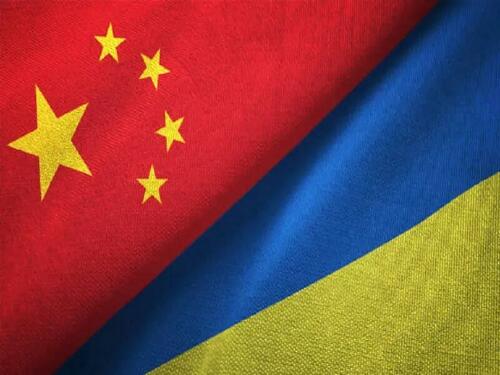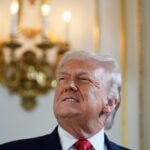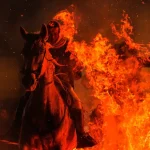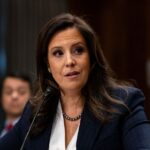
Authored by Andrew Korybko via Substack,
The conventional thinking is that Ukraine isn’t interested in resuming peace talks with Russia unless the latter capitulates to its unacceptable ultimatums, otherwise it’ll continue fighting “until the last Ukrainian”, but that might be about to be turned on its head as a result of recent developments. In the span of less than a week: Trump talked to Zelensky about his peace plan; the Vatican’s top diplomat visited Ukraine; and Ukraine’s Foreign Minister is visiting China, the last two for the first time since 2022.
From the looks of it, Ukraine is fretting about Trump’s likely return to power and wants to get ahead of the curve by exploring paths to peace, which are intended to give it a chance to shape the process instead of being completely controlled by it if the US suddenly decides to end its latest “forever war”. The supplementary developments that led up to the three aforementioned ones are Orban’s peace missions and the unveiling of former British Prime Minister Johnson’s peace plan.
Regarding the first of these two, this saw the Hungarian leader travel to Kiev, Moscow, Beijing, DC, and Mar-a-Lago, after which he recommended in a report to the EU that their bloc explore the modalities of the next peace conference with China and resume dialogue with Russia. As for the second, this infamous hawk proposed territorial compromises with Russia and Ukraine protecting the rights of Russian speakers. These five developments were also just followed by an unexpected proof of concept.
It was announced on Tuesday that 14 Palestinian factions signed the Beijing Declaration that’ll end the years-long divisions between Hamas and Fatah, thus showing that lightning does indeed strike twice after China brokered the Iranian-Saudi rapprochement last year. For background, it was explained here how China is trying to organize a Brazilian-fronted parallel peace process on Ukraine ahead of and/or during November’s G20 in Rio, which is more realistic than ever now.
To explain, Zelensky read the writing on the wall over the past few weeks about Biden’s inevitable departure from the campaign, especially after Trump’s famous fist-pumping picture that followed his miraculous survival of an assassination attempt earlier this month turned him into a hero. This places his unprecedented proposal of Russia participating in the next round of Swiss-like Ukraine talks in November into context even though he hasn’t yet at this point signaled any willingness to compromise with it.
He suggested this on 15 July, and it was sometime last week that the Vatican’s and Ukraine’s top diplomats finalized their trips, the first to Ukraine and the second to China. 19 July then saw Johnson publish his peace plan, the details of which he likely conveyed to Ukraine and others beforehand, which was the same day as the Trump-Zelensky call. Then the previously mentioned diplomats set off on their respective trips and China coincidentally proved yet again that it can broker game-changing peace deals.
The EU disavowed Orban’s peace mission and associated report, yet the visit of the Vatican’s top diplomat to Ukraine hints that they might be relying on the Holy See as a backchannel for finding out whether the political fallout from Biden’s disastrous debate with Trump changed Zelensky’s views.
After all, Orban visited Kiev less than a week afterwards when it wasn’t yet clear what its full implications would be, so it’s sensible to dispatch someone else a few weeks later to follow up on everything.
Zelensky’s unprecedented proposal last week for Russia to participate in the next round of Swiss-like Ukraine talks in November showed the world that he’s becoming more flexible at least in his rhetoric, thus paving the way for the Vatican’s top diplomat to visit Kiev and for his own such one to visit Beijing.
Johnson’s peace plan also contained some carrots in it for Russia pertaining to its return to the G7 and the resumption of its partnership with NATO, which Trump may or may not have discussed with Zelensky.
The last part remains unclear since Johnson noted in his op-ed that he talked about the conflict with Trump but clarified that the views expressed therein are his own and claimed that he supposedly doesn’t know how the former American leader might try to resolve this conflict if he’s re-elected. Nevertheless, it’s more likely than not that Johnson sought to informally float at least some of Trump’s proposals in his piece, with the former promoting them before the public and the latter before Zelensky.
Trump considers China to be the US’ systemic rival so he doesn’t want it to play any role in the peace process, yet Zelensky just dispatched his top diplomat to Beijing regardless, which is intended to gain negotiating leverage with the US regardless of whatever November’s outcome may be. That trip is obviously at variance with American interests, which suggests that he’s once again “going rogue” a bit by behaving somewhat independently of his patrons.
Zelensky knows that his maximalist goal of reconquering all of Ukraine’s lost territory is unrealistic no matter what he says for the purpose of keeping morale high. He therefore wants to retake as much as he can before the US either becomes too fatigued with its latest “forever war” or is forced by circumstances into “Pivoting (back) to Asia” before it’s ready. By publicly displaying interest in China’s mediation, he hopes to either keep the US supporting him for longer or to reach a better peace deal with China’s help.
It's a gamble, but he hopes that the next US President might either become so nervous about him flirting with China that they decide to give him more of what he’s been demanding and remove their restrictions or that China can convince Russia to scale back some of its maximalist demands for peace if they won’t. Nobody can confidently predict how far he’ll go in this regard nor exactly how serious he is, but it’s undeniable that Zelensky is changing tack to an extent, which is remarkable development in this conflict.
Authored by Andrew Korybko via Substack,
The conventional thinking is that Ukraine isn’t interested in resuming peace talks with Russia unless the latter capitulates to its unacceptable ultimatums, otherwise it’ll continue fighting “until the last Ukrainian”, but that might be about to be turned on its head as a result of recent developments. In the span of less than a week: Trump talked to Zelensky about his peace plan; the Vatican’s top diplomat visited Ukraine; and Ukraine’s Foreign Minister is visiting China, the last two for the first time since 2022.
From the looks of it, Ukraine is fretting about Trump’s likely return to power and wants to get ahead of the curve by exploring paths to peace, which are intended to give it a chance to shape the process instead of being completely controlled by it if the US suddenly decides to end its latest “forever war”. The supplementary developments that led up to the three aforementioned ones are Orban’s peace missions and the unveiling of former British Prime Minister Johnson’s peace plan.
Regarding the first of these two, this saw the Hungarian leader travel to Kiev, Moscow, Beijing, DC, and Mar-a-Lago, after which he recommended in a report to the EU that their bloc explore the modalities of the next peace conference with China and resume dialogue with Russia. As for the second, this infamous hawk proposed territorial compromises with Russia and Ukraine protecting the rights of Russian speakers. These five developments were also just followed by an unexpected proof of concept.
It was announced on Tuesday that 14 Palestinian factions signed the Beijing Declaration that’ll end the years-long divisions between Hamas and Fatah, thus showing that lightning does indeed strike twice after China brokered the Iranian-Saudi rapprochement last year. For background, it was explained here how China is trying to organize a Brazilian-fronted parallel peace process on Ukraine ahead of and/or during November’s G20 in Rio, which is more realistic than ever now.
To explain, Zelensky read the writing on the wall over the past few weeks about Biden’s inevitable departure from the campaign, especially after Trump’s famous fist-pumping picture that followed his miraculous survival of an assassination attempt earlier this month turned him into a hero. This places his unprecedented proposal of Russia participating in the next round of Swiss-like Ukraine talks in November into context even though he hasn’t yet at this point signaled any willingness to compromise with it.
He suggested this on 15 July, and it was sometime last week that the Vatican’s and Ukraine’s top diplomats finalized their trips, the first to Ukraine and the second to China. 19 July then saw Johnson publish his peace plan, the details of which he likely conveyed to Ukraine and others beforehand, which was the same day as the Trump-Zelensky call. Then the previously mentioned diplomats set off on their respective trips and China coincidentally proved yet again that it can broker game-changing peace deals.
The EU disavowed Orban’s peace mission and associated report, yet the visit of the Vatican’s top diplomat to Ukraine hints that they might be relying on the Holy See as a backchannel for finding out whether the political fallout from Biden’s disastrous debate with Trump changed Zelensky’s views.
After all, Orban visited Kiev less than a week afterwards when it wasn’t yet clear what its full implications would be, so it’s sensible to dispatch someone else a few weeks later to follow up on everything.
Zelensky’s unprecedented proposal last week for Russia to participate in the next round of Swiss-like Ukraine talks in November showed the world that he’s becoming more flexible at least in his rhetoric, thus paving the way for the Vatican’s top diplomat to visit Kiev and for his own such one to visit Beijing.
Johnson’s peace plan also contained some carrots in it for Russia pertaining to its return to the G7 and the resumption of its partnership with NATO, which Trump may or may not have discussed with Zelensky.
The last part remains unclear since Johnson noted in his op-ed that he talked about the conflict with Trump but clarified that the views expressed therein are his own and claimed that he supposedly doesn’t know how the former American leader might try to resolve this conflict if he’s re-elected. Nevertheless, it’s more likely than not that Johnson sought to informally float at least some of Trump’s proposals in his piece, with the former promoting them before the public and the latter before Zelensky.
Trump considers China to be the US’ systemic rival so he doesn’t want it to play any role in the peace process, yet Zelensky just dispatched his top diplomat to Beijing regardless, which is intended to gain negotiating leverage with the US regardless of whatever November’s outcome may be. That trip is obviously at variance with American interests, which suggests that he’s once again “going rogue” a bit by behaving somewhat independently of his patrons.
Zelensky knows that his maximalist goal of reconquering all of Ukraine’s lost territory is unrealistic no matter what he says for the purpose of keeping morale high. He therefore wants to retake as much as he can before the US either becomes too fatigued with its latest “forever war” or is forced by circumstances into “Pivoting (back) to Asia” before it’s ready. By publicly displaying interest in China’s mediation, he hopes to either keep the US supporting him for longer or to reach a better peace deal with China’s help.
It’s a gamble, but he hopes that the next US President might either become so nervous about him flirting with China that they decide to give him more of what he’s been demanding and remove their restrictions or that China can convince Russia to scale back some of its maximalist demands for peace if they won’t. Nobody can confidently predict how far he’ll go in this regard nor exactly how serious he is, but it’s undeniable that Zelensky is changing tack to an extent, which is remarkable development in this conflict.
Loading…





